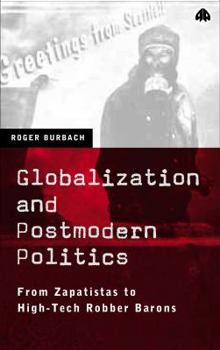Globalization and Postmodern Politics: From Zapatistas to High-Tech Robber Barons
An overview of global politics, the corporate powers who dominate the information age and the new revolutionary movements rising up to challenge them. This description may be from another edition of this product.
Format:Paperback
Language:English
ISBN:0745316492
ISBN13:9780745316499
Release Date:January 2001
Publisher:Pluto Press (UK)
Length:184 Pages
Weight:0.65 lbs.
Dimensions:0.5" x 5.3" x 8.5"
Customer Reviews
1 rating
A 'post-Marxist' perspective on anti-capitalism
Published by Thriftbooks.com User , 23 years ago
A new movement has arrived. Wherever the elites of global capitalism meet, under the auspices of the WTO, World Bank, IMF, or the EU, so too do protestors, in their tens of thousands. But what is its nature?Some sense of it is given by Roger Burbach in this book. For him, public enemy number one is neo-liberalism. It was `[t]he dictatorship of Augusto Pinochet in Chile', he writes, that served as the first laboratory for an experiment in neo-liberal economics in the mid- and late 1970s with its bloody repression of the working class, privatization of state companies, and dismantling of the public health system.Neo-liberal strategies began in countries such as Chile, Britain and Canada in the mid-1970s and were internationally hegemonic by the late 1990s.But the model is failing society. Neo-liberal globalisation has not ushered in an epoch of peace and prosperity. For Burbach, this is `an epoch of extraordinary conflict, upheaval and uncertainty', as manifested in frequent economic crises and financial turbulence, particularly in the Third World. However, despite economic implosion in much of the world, certain businesses have been doing very well for themselves, notably the major TNCs. The bulk of the world market in many sectors is divided amongst a few giants. These use their technological edge but also economic muscle and political influence in the pursuit of market dominance. One crucial means to this end is the control over knowledge. Burbach quotes an intellectual property lawyer to the effect that the control of intellectual assets by modern corporations `makes the monopolies of the nineteenth century robber barons look like penny-ante operations'.For workers the neo-liberal world has a different face. In the wake of employers' offensives against union organisation poverty and insecurity have been on the rise. `While the new robber barons have accumulated enormous fortunes', Burbach claims `workers have reaped few of the benefits'. Groups such as women and blacks have been affected especially adversely by labour `flexibilisation' and welfare cuts. And yet the incomes of the upper echelons continue to soar. Polarisation, in other words, is not only a matter of the widening `North-South gap'. As Burbach sees it, [t]he concepts of core and periphery, or North and South, are increasingly not geographic per se as much as they are social class in character.What of the movement that opposes these developments? Despite differences, there is one positive project that unites all its constituents, namely to encourage the self-assertion of individuals defending their conditions of life and work. Ultimately the common project is participatory democracy. As Burbach puts it, `What these various movements have in common is the goal of expanding the practice of democracy to include the economic realm. They hearken back to the Greek origins of the word: rule of the people'.Burbach's project is, despite his claim to be `constructing entirely new radical na






